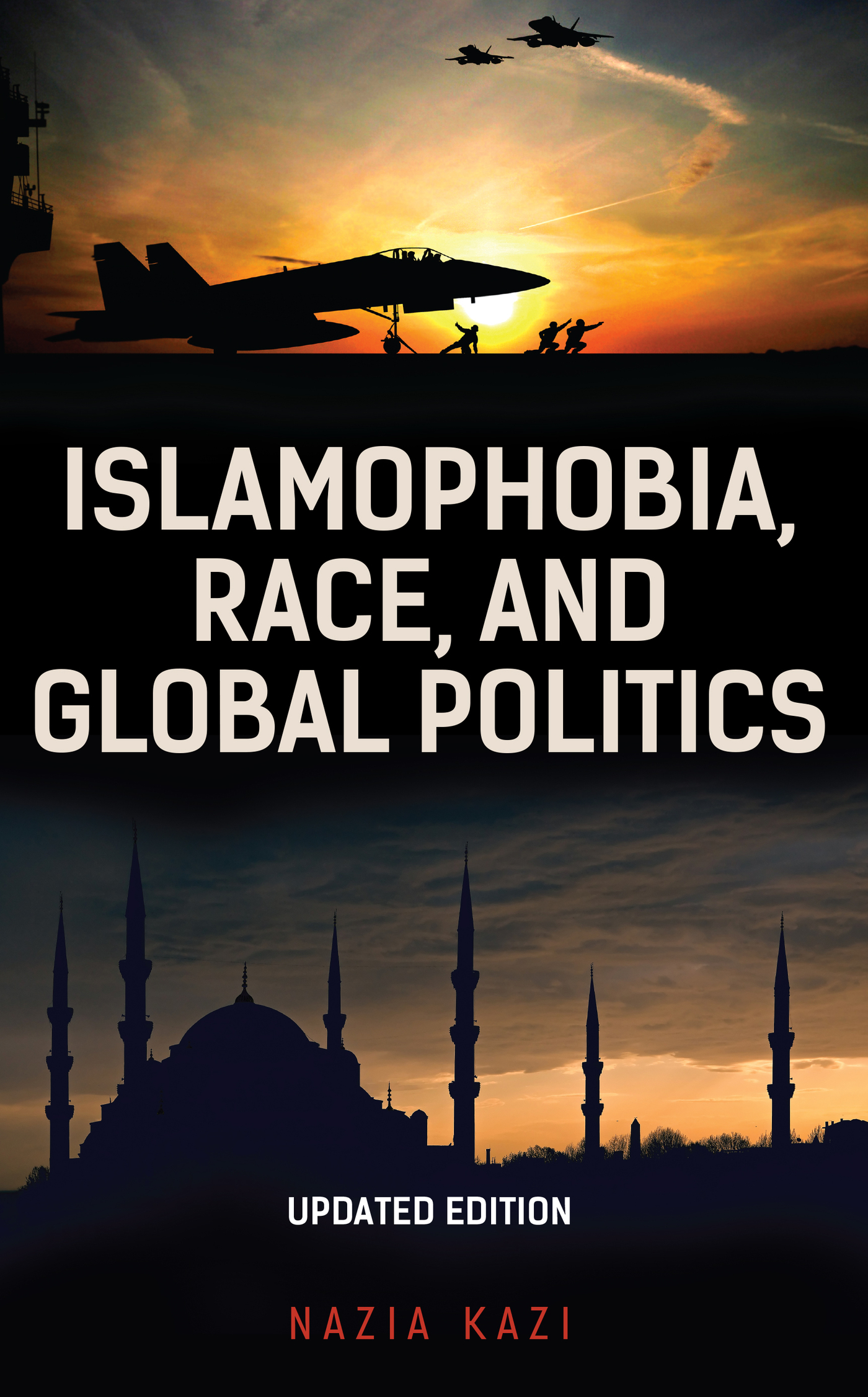Islamophobia, Race, and Global Politics
Islamophobia, Race, and Global Politics
Updated Edition
Nazia Kazi
ROWMAN & LITTLEFIELD
Lanham Boulder New York London
Published by Rowman & Littlefield
An imprint of The Rowman & Littlefield Publishing Group, Inc.
4501 Forbes Boulevard, Suite 200, Lanham, Maryland 20706
https://rowman.com
86-90 Paul Street, London EC2A 4NE
Copyright 2021 by The Rowman & Littlefield Publishing Group, Inc.
All rights reserved. No part of this book may be reproduced in any form or by any electronic or mechanical means, including information storage and retrieval systems, without written permission from the publisher, except by a reviewer who may quote passages in a review.
British Library Cataloguing in Publication Information Available
Library of Congress Cataloging-in-Publication Data
Names: Kazi, Nazia, 1982 author.
Title: Islamophobia, race, and global politics / Nazia Kazi.
Description: Updated Edition. | Lanham : Rowman & Littlefield, 2021. | Revised edition of the authors Islamophobia, race, and global politics [2019] | Includes bibliographical references and index.
Identifiers: LCCN 2021020669 (print) | LCCN 2021020670 (ebook) | ISBN 9781538157091 (cloth) | ISBN 9781538157107 (paperback) | ISBN 9781538157114 (epub)
Subjects: LCSH: IslamophobiaUnited States. | Moral panicsUnited States. | MuslimsUnited StatesSocial conditions.
Classification: LCC E184.M88 K39 2021 (print) | LCC E184.M88 (ebook) | DDC 305.6/97dc23
LC record available at https://lccn.loc.gov/2021020669
LC ebook record available at https://lccn.loc.gov/2021020670
 TM The paper used in this publication meets the minimum requirements of American National Standard for Information Sciences Permanence of Paper for Printed Library Materials, ANSI/NISO Z39.48-1992.
TM The paper used in this publication meets the minimum requirements of American National Standard for Information Sciences Permanence of Paper for Printed Library Materials, ANSI/NISO Z39.48-1992.
Dedicated to Hasan and Tasnim
Preface
As I put this book together, I received word that the officer who murdered Philando Castile was cleared of all charges by a jury: a jury that had seen video footage of Castiles death, recorded by his girlfriend in the moments following the gunshots. A jury that had also seen Castile calmly, collectedly, tell the officer, Just so you know, I have a legally registered firearm. The officer says, Dont reach for it. Castile responds, Im not. The officer quickly shoots him dead in a scene that haunts me to this day.
To me, it doesnt matter one bit that Philando Castile was beloved in his community (which he most certainly was). That he memorized the allergies of the students he served in the lunchroom and, when they were short on cash, helped them pay for their lunches (which he did). It doesnt matter that Diamond Reynolds, his girlfriend, and her child sat in the car and witnessed his murder before being put in the back of a police van (which they did). Evidence of Castiles humanity and warmth is not at issue. What is at issue is that officer-involved shootings (as the media so passively calls them) of black people are so very normalized, so commonplace, that a jury can, in spite of incontrovertible evidence, acquit the officer.
Just as a jury decided no criminal charges should be brought in the death of Kenneth Chamberlain Sr., a man who was killed by police after accidentally pushing the button on his LifeAid medical alert device. An audio recording of the mans murder even revealed the officer using racial slurs against Chamberlain, who was tasered and then shot dead.
What place, you might ask, do the deaths of Chamberlain and Castileor, for that matter, Tamir Rice, Sandra Bland, Eric Garner, Mike Brown, and Oscar Granthave in a book on Islamophobia?
Quite simply, it is this: rage has fueled the writing of this book. The source of my rage is state-sanctioned violence, the backbone of white supremacy. As this book will show, it is white supremacy that has left more than a million Iraqis dead at the hands of US-imposed violence,
You might be surprised that a social science professor is openly claiming that rage has inspired her to write a book. Many believe that academia is a place for dispassionate, rational, impartial reasoningthat emotional reactions have no place in the study of human culture and society. But let me ask: What does one say about a society that calmly debates whether or not the state was in its rights to gun down Ramarley Graham, a child, in his own home?
I teach at a predominantly white institution where students are often utterly unfamiliar with Americas violent racial past and present. There is an entrenched callousness on racial matters, a sense of well, thats just how things arewhat Ian Haney Lpez calls commonsense racism. Many students cling to a latent belief that America is racially unequal not because of egregious miscarriages of justice but because the groups on the margins are somehow undeniably responsible for being there.
Yet one semester, something surprising happened in one of my classes. I was showing my students, who are about eighteen to twenty years old, a film called Harvest of Empire: A History of Latinos in America. This documentary asks why Latinos come to the United Statesmany of them illegallyand juxtaposes that question with the oft-obscured fact of US military intervention in the countries from which these migrants come. When the lights dim and the documentary voice-over begins, an inevitable glassy-eyed inattentiveness often sweeps across their faces. Yet one semester, the section began that described the years of support the United States provided the regime of the dictator Rafael Trujillo in the Dominican Republic. As the film documented the systematic tortures, executions, and rapes that were part of Trujillos rule, I saw a student wipe a tear from her cheek, horrified at the violence perpetrated by a onetime US ally. I cursed my own callousness at exploring something this disturbingthe US role in destabilizing governments across Latin America for its own enrichmentso cavalierly, without considering the possibility that a student might have an emotional reaction, as well they should. After a decade of teaching college students, Ive noticed something remarkable: once they begin to recognize that the knowledge theyve taken for granted about power and race is incomplete, students exercise deep humility and care about matters of justice. This book is meant to allow such a reckoning.
I dont believe that the social sciences are a place to be detached, neutral, or calmespecially when matters of justice are involved. Instead, our study of race should allow for us to have deeply human reactions to the discoveries we make.
Now, a note on my methodology. Parts of this book contain ethnographic data. As an anthropologist, I have conducted several years of fieldwork with Muslim American organizations grappling with questions of Islamophobia, race, and power. This involved attending Islamic conventions, conferences, and meetups to draw conclusions about how members of these groups were handling the shifting realities for Muslims in the United States. I draw heavily from this ethnographic data. However, when I do so, it is with special care to protect my subjects anonymity. To this end, names and other identifying information have been changed.
Id like to urge you not to see the quotes and commentary from Muslim Americans in this text as representing Muslim Americans as a whole. In other words, a quote from Yaqub or Muhammad is simply thata quote from one person. It is not a reflection of the Muslim American community. Indeed, as you will see, its not especially useful to talk about Muslim Americans. This group is so radically diverse in their political leanings, their socioeconomic backgrounds, and their racial identities that the term hardly makes any sense. More importantly, Muslims in the United States have drastically different experiences of Islamophobia. Some bear the brunt of state-sponsored anti-Muslim action, such as deportations, special registration, or detention. Others experience Islamophobia in the form of workplace discrimination or suspicion from their neighbors.
Next page
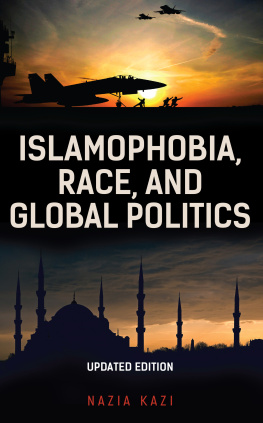

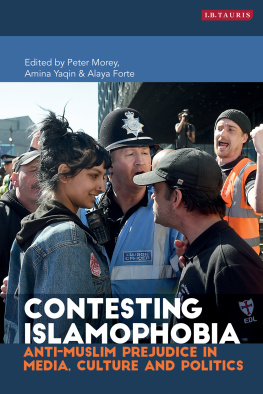
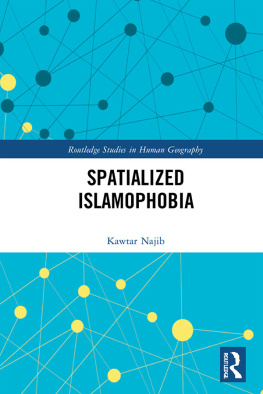
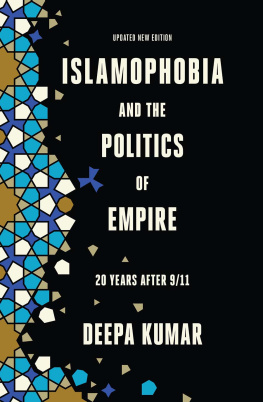
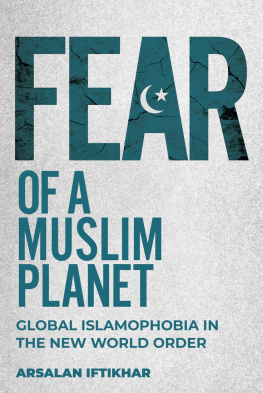



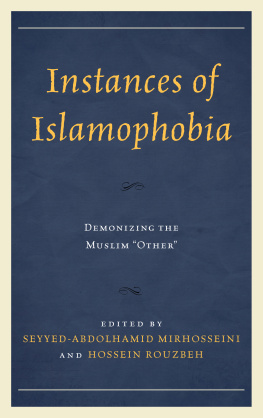

 TM The paper used in this publication meets the minimum requirements of American National Standard for Information Sciences Permanence of Paper for Printed Library Materials, ANSI/NISO Z39.48-1992.
TM The paper used in this publication meets the minimum requirements of American National Standard for Information Sciences Permanence of Paper for Printed Library Materials, ANSI/NISO Z39.48-1992.